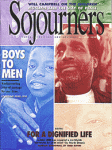Far from the Beltway, in the red clay country of rural Georgia, James Gibson embraces a more ambitious notion of reform. "We need campaign spending rules that make it equal for all people running for office to have the same amount of money," he says. Gibson believes the entire system can be changed, and he’s part of a growing movement that views campaign finance reform as a civil rights issue. He’s on the front lines of an effort seeking change through the courts. Along with a coalition of civil rights groups and low-income voters, Gibson is a plaintiff in a lawsuit contending that wealth plays such a great role in deciding who gets elected that it violates the Equal Protection and First Amendment rights of lower-income voters and candidates.
This latter-day voting rights struggle came into focus during the 1996 Georgia elections. James Gibson rolled his wheelchair many miles, canvassing voters on behalf of John White, a 17-year veteran state representative and a candidate for the state senate from Albany, Georgia. Outspent by his opponent 17 times over, White lost, and Gibson believes lack of money was the reason. That’s why he joined the lawsuit seeking a federal judge’s order mandating the creation of publicly financed campaigns for state office.
Another plaintiff in the lawsuit is the director of the Southern regional office of the NAACP, Nelson Rivers. He calls publicly financed campaigns "a new weapon in our arsenal to fight for justice. Just as we fought to end the white primary, we will fight for the end of the wealth primary."
The "wealth primary" to which Rivers refers is the system of financing campaigns that excludes non-wealthy voters and decisively influences the outcome of elections. (In 1994, 88 percent of U.S. House winners and 86 percent of U.S. Senate winners outspent their opponents.) Like the white primaries of the past, today’s wealth primary prevents participation of the 99.75 percent of people who don’t contribute more than $200 to campaigns. The system violates the constitutional guarantee of equal protection for all in the political process and undermines the constitutional right to an equal and meaningful vote.
MEANTIME, BACK inside the Beltway, the crumpled tissues of reform have yet again been swooshed down the flusher, and both parties are raising large donations at nearly triple the rate they did four years ago, according to the Federal Election Commission. Running some of the U.S. House’s most expensive campaigns in the last three election cycles, Gephardt is second only to Newt Gingrich on the House list of top money raisers for this year’s elections. And—like the big spenders of both parties—he’s breaking no laws. The Supreme Court enabled this scenario through its 1976 ruling in Buckley vs. Valeo, which struck down congressional campaign spending limits and equated free spending with free speech.
But the court has been wrong before, and it has reversed itself before. An example is the poll tax, a fee charged to citizens in order to vote—a fee that served as a barrier to poor citizens of every race. The court upheld the poll tax in 1937 and again in 1951. Finally in 1966, in the heat of the civil rights movement, the Supreme Court abolished the poll tax as unconstitutional.
James Gibson, the NAACP, and the other plaintiffs in the Georgia lawsuit know they’re working on an epic project. There may be many stanzas written before Buckley can be overturned. But they believe that theirs is a song for the future. And indeed, if by their words they can be judged, congressional leaders already know the tune. Dick Gephardt ended the Kennedy School speech by saying: "Don’t tell me there are no more great battles to fight. We can challenge the status quo and create a progressive vision for a new century. And to succeed, we must all rise to the occasion."
To which Gibson and company would intone: "Amen."
SHARON BASCO is communications director for the National Voting Rights Institute in Boston.

Got something to say about what you're reading? We value your feedback!